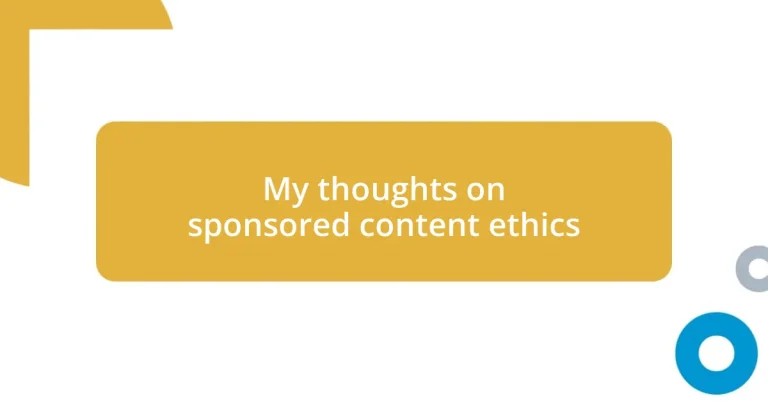Key takeaways:
- Transparency in sponsored content builds trust, enabling consumers to make informed choices and promoting ethical standards.
- Maintaining a balance between creativity and honesty is essential to ensure authenticity and avoid manipulation in advertising.
- Best practices for sponsored content include clear labeling, alignment with creator values, and integrating products into personal narratives.
- Legal considerations, such as FTC guidelines and respect for intellectual property, are crucial for maintaining credibility and avoiding legal issues.
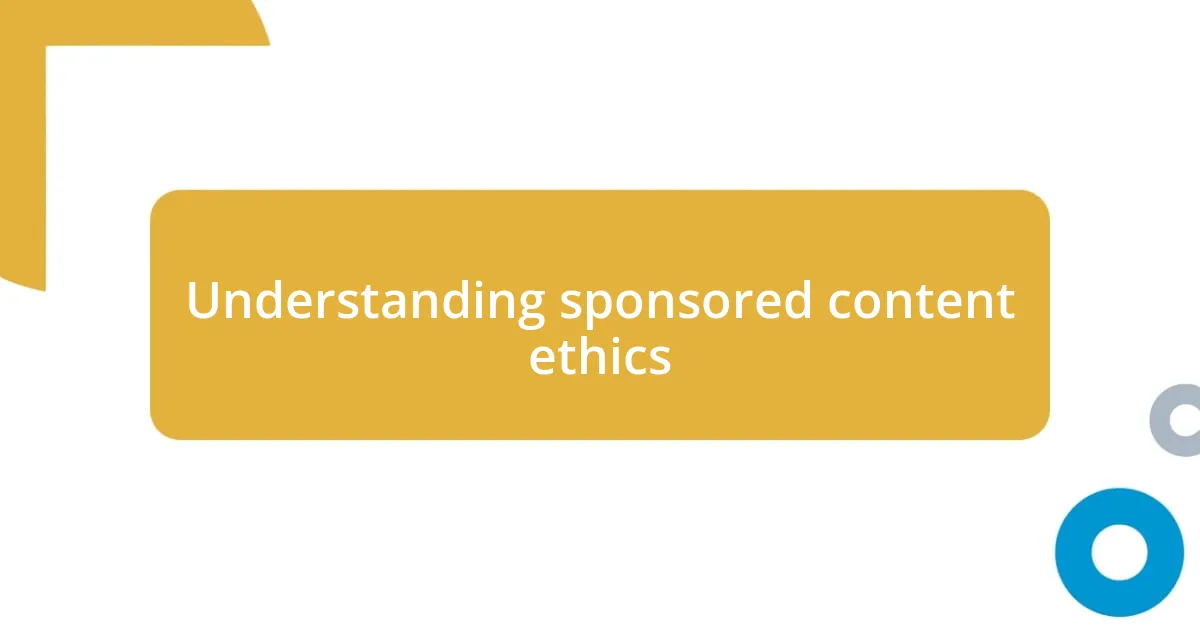
Understanding sponsored content ethics
Understanding the ethics behind sponsored content is crucial for both creators and consumers. I remember the first time I encountered a sponsored post that seemed so authentic; it tricked me into believing it was genuine content. This experience sparked my curiosity about how transparency influences our trust as readers. Are we truly aware of the fine line that separates genuine content from marketing?
One fundamental aspect of sponsored content ethics lies in clear disclosure. I often find myself asking how readers can fully trust what they consume if they’re unaware of what’s paid for. I’ve seen some influencers and companies do a fantastic job of making it clear when content is sponsored, which builds a relationship based on trust rather than manipulation. It’s interesting, right? The more upfront they are, the more I feel connected to their message.
Moreover, ethical responsibility goes beyond just labeling content. There’s an emotional weight attached to ensuring the product or service promoted is genuinely beneficial. I recall a time when I saw a glowing review of a health product that turned out to be more hype than substance. It made me wonder: How can content creators stand by their values while promoting brands? It’s a delicate balance, but keeping audience loyalty in mind can guide ethical choices in sponsored content.
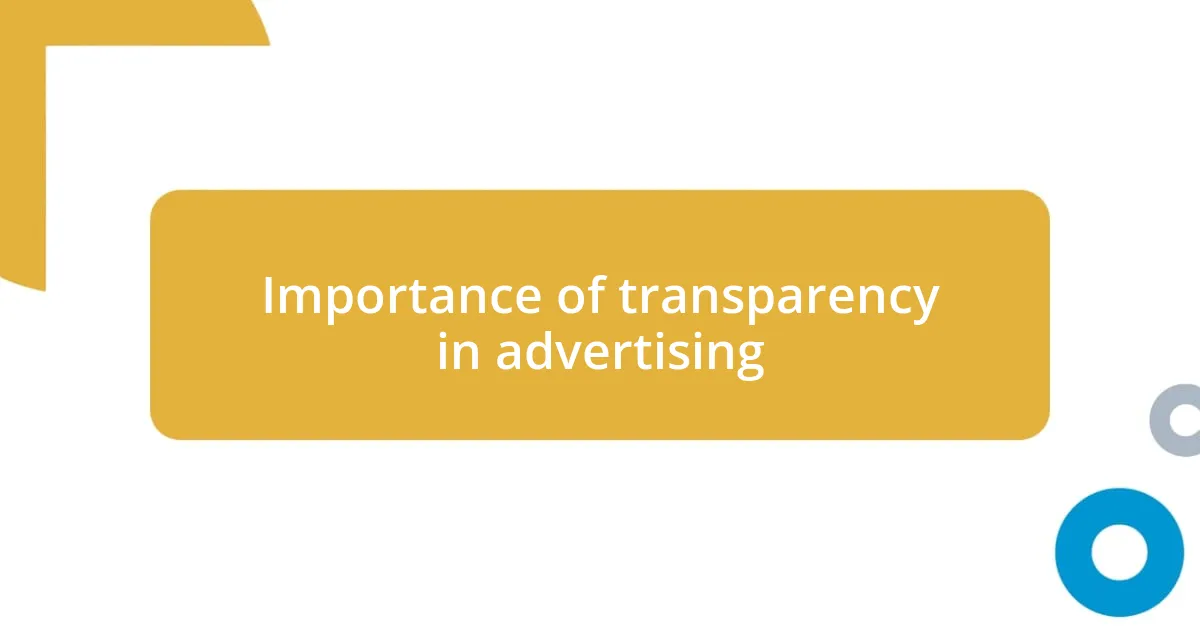
Importance of transparency in advertising
Transparency in advertising is critical for fostering trust between creators and their audience. I remember scrolling through social media and coming across a post from a seemingly relatable influencer who casually dropped a product link without any mention of sponsorship. At that moment, I felt a twinge of betrayal. It was unsettling to realize I had unknowingly been influenced by a hidden agenda. This experience solidified my belief that being transparent about advertising relationships not only builds authenticity but also enhances credibility.
Here are some key reasons why transparency in advertising matters:
- Trust Building: When sponsors are open about their partnerships, it cultivates trust and strengthens the creator-audience relationship.
- Consumer Protection: Clear labeling allows consumers to make informed choices, reducing the risk of manipulation by persuasive marketing tactics.
- Ethical Standards: Transparency helps maintain ethical standards in advertising, reflecting a commitment to honesty in content creation.
- Brand Loyalty: Audiences are more likely to remain loyal to brands and creators who prioritize authenticity and disclose their partnerships openly.
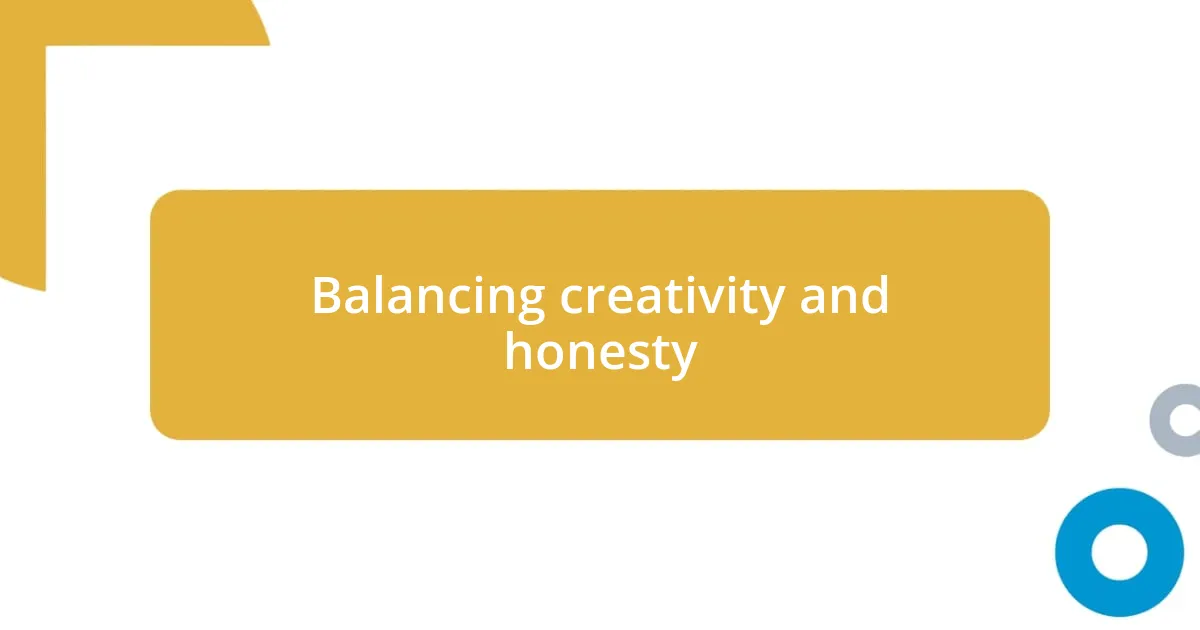
Balancing creativity and honesty
Striking the right balance between creativity and honesty is a constant challenge in sponsored content. I often reflect on how creative ideas can easily blur the lines of authenticity. For instance, I once saw a vibrant video campaign that was so engaging it drew me in completely. But the more I watched, the more I sensed duplicity beneath the surface. It’s a tricky dance – while creativity can enhance storytelling, it must never overshadow the essence of honesty.
The creative landscape is rich with innovative techniques, yet these can sometimes mask the underlying truth. I recall when I was swept away by a stunning visual advertisement for a skincare line. Everything from the music to the special effects captivated me. However, after purchasing the product, I felt let down. This experience taught me: creativity should highlight the genuine qualities of a product, not manipulate emotions. It’s essential that content creators remember they wield significant influence and must wield it responsibly.
What’s fascinating is that this balance isn’t just about following rules. It’s about forging connections that resonate deeply. When I share content that balances creativity and honesty, I aim to evoke genuine feelings and understandings rather than mere admiration. It’s a reminder that ethical storytelling can be captivating and sincere.
| Creativity | Honesty |
|---|---|
| Engages the audience through innovative ideas | Establishes trust and builds lasting relationships |
| Can sometimes overshadow the truth | Ensures transparency in sponsored content |
| Encourages emotional responses | Facilitates informed consumer choices |
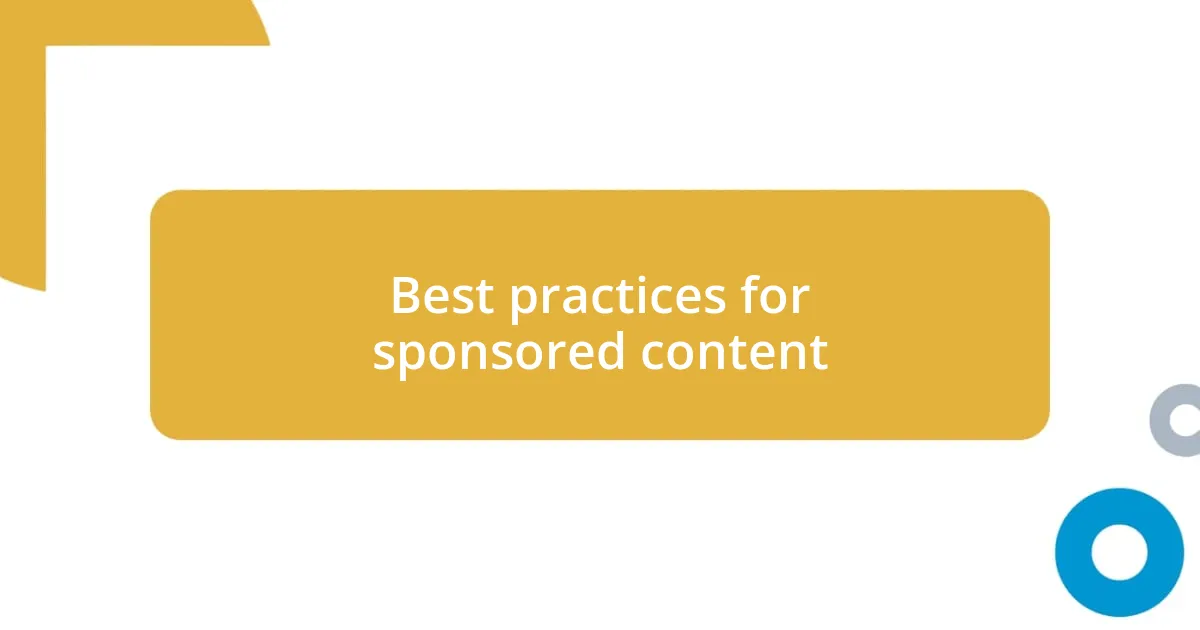
Best practices for sponsored content
Sponsored content requires creators to adhere to certain best practices to maintain integrity. For instance, I’ve always found it essential to clearly label sponsored posts as such. There’s something reassuring about seeing a tag that says “paid partnership.” It creates an immediate understanding that I’m engaging with a piece of content built around a business relationship rather than just a casual recommendation. This simple action reassures me that the influencer respects their audience enough to be honest.
Another important practice is to ensure that sponsored content aligns with the creator’s established values and audience interests. I recall a food blogger who partnered with a fast-food chain; her usual content revolved around healthy eating. Watching her promote greasy burgers felt disingenuous and left me questioning her credibility. Striking that alignment is crucial; it helps the audience feel like they’re engaging with content that truly reflects the creator’s authentic self, rather than a random payment for promotion.
Lastly, I find that storytelling is a powerful approach in sponsored content. When a creator integrates a product seamlessly into a personal narrative, it feels less like an advertisement and more like an everyday recommendation. I often think about a travel vlogger who shared his experience with a specific backpack during his adventures. His passion was infectious! I didn’t just see a product; I felt his excitement and trust. This connection makes me more inclined to support the brand, as I know it came from a place of genuine experience, rather than just an agenda. Isn’t that what we all crave—authenticity wrapped in a good story?
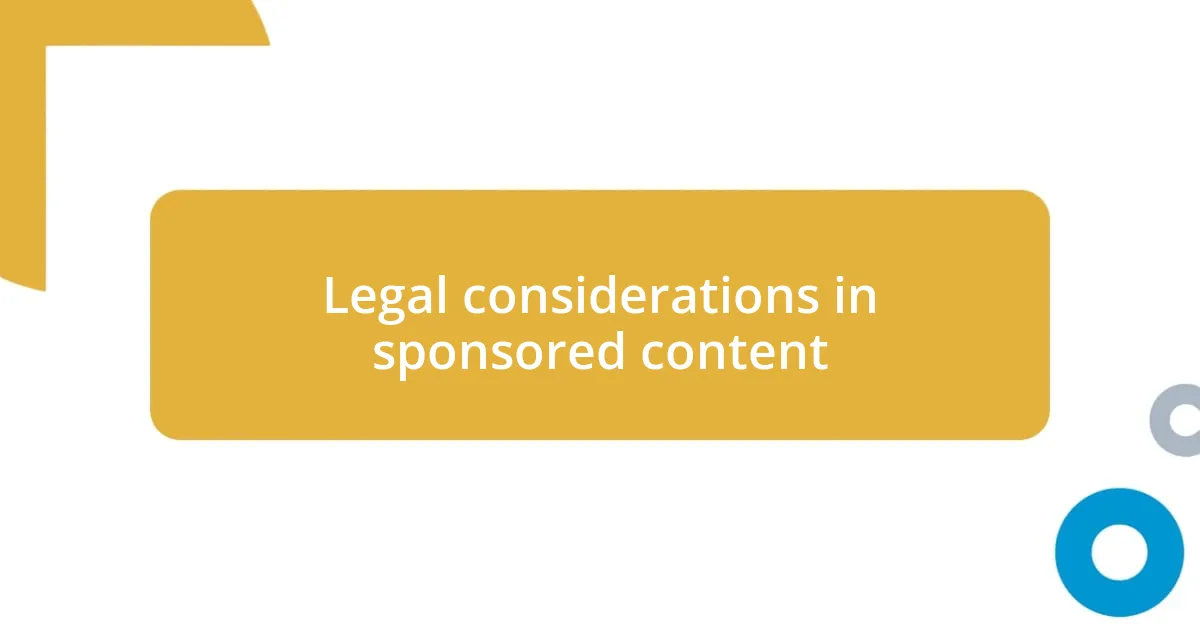
Legal considerations in sponsored content
Legal considerations in sponsored content are crucial to ensure transparency and compliance. I remember when I first learned about the Federal Trade Commission (FTC) guidelines; it was eye-opening. The FTC requires that any paid promotion must be clearly disclosed. I often think: how can we trust the content if we don’t know the creator was compensated? This understanding sparked a commitment in me to prioritize honest representation in my own sponsored collaborations.
Additionally, I’ve seen how legal issues arise when the fine print isn’t observed. For example, a friend of mine faced backlash for not disclosing a partnership that led to confusion among her followers. They felt misled, and it damaged her credibility. It raised a question for me: can we really engage authentically without playing by the rules? A simple disclosure can save both creators and brands from potential legal entanglements and trust issues.
Moreover, there’s the aspect of intellectual property. I once encountered a situation where a small business used stock images without proper licensing for their sponsored posts. Not only was it a legal misstep, but it also sent the message that they weren’t invested in creating original content. It’s vital to respect creative ownership, as it reflects our integrity as content creators. After all, isn’t it our responsibility to model ethical behavior in every aspect of our work?












